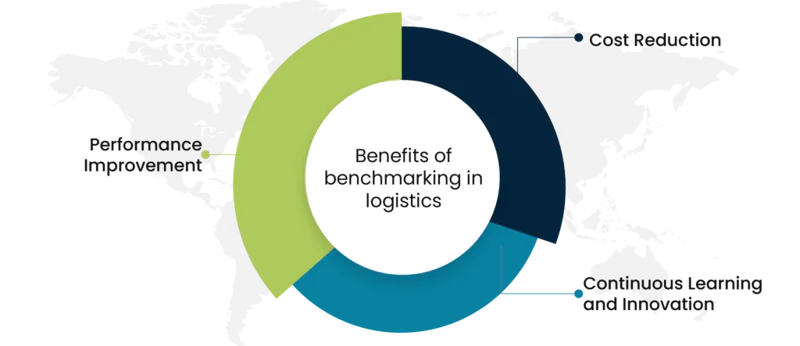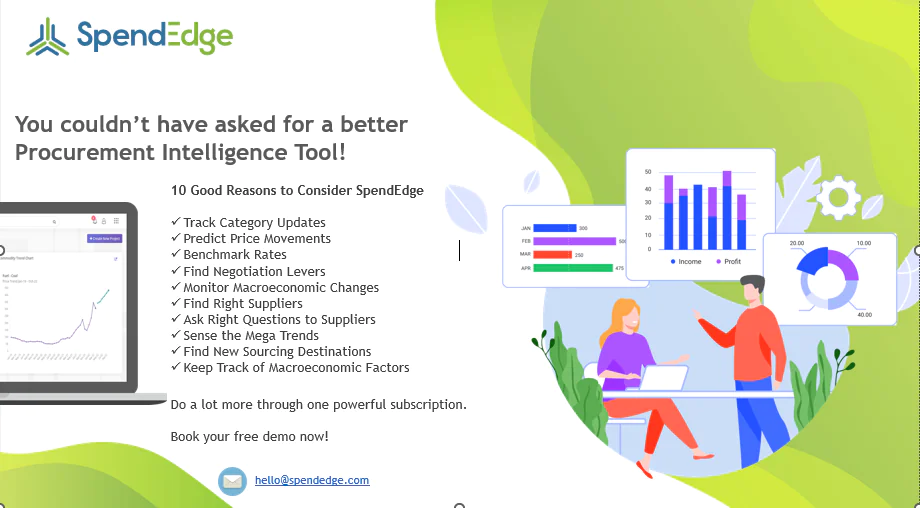The logistics industry functions as the backbone of global commerce. With growing demand for fast delivery services, rising customer expectations, and the increasing emphasis on convenience, logistics companies face immense pressure to improve operational performance. A critical enabler of success is the selection of the right logistics suppliers—partners who deliver consistent quality, ensure timely delivery, offer competitive pricing, provide excellent service, and actively mitigate risk.
To achieve operational excellence, logistics leaders rely on supplier benchmarking—a strategic, data-driven process used to compare current or potential suppliers based on predefined Key Performance Indicators (KPIs). This process helps identify top-performing suppliers, reduce performance gaps, and establish reliable, long-term vendor partnerships. By integrating logistics marketing benchmarks into these evaluations, companies can assess supplier performance not only on operational metrics but also on how suppliers contribute to brand reputation, service visibility, and market competitiveness. Effective supplier benchmarking drives informed decision-making around sourcing, contracts, and continuous process improvement, ultimately strengthening the logistics supply chain.
What are the Five Key Criteria Used for Supplier Benchmarking?

Quality
To successfully conduct supplier benchmarking, companies must maintain a scorecard to measure, evaluate, and compare potential partners’ performance as per their chosen Key Performance Indicators (KPI). In a growing and highly demanded industry, ensuring the quality of products and services is imperative to maintaining high customer satisfaction levels, gaining a competitive edge, and differentiating services from other companies. Procurement in the logistics industry can include transport vehicles, storage containers, employees and service personnel, machinery and loading equipment, financial services, legal services, and various other major products or services. The quality of these procured products and services directly impacts the quality of offerings provided by the company to its customers and is a crucial determining factor for the selection or elimination of a potential partner.
Delivery
When choosing suppliers and potential strategic partners, companies must be sure of an alignment pertaining to timelines, deadlines, expected quality, and as the listed purchase order. Ensuring that products and services are procured, produced, and distributed within a stipulated timeline is essential to maintain high customer satisfaction levels, engage major clients, and expand operations. The logistics industry is challenging, and failure to adhere to timelines can lead to significant backlash and customer attrition. This particular KPI also includes ensuring that delivered products are in optimal condition, undamaged, and functioning as intended and that all orders are received in full. Any missing components, damaged or broken pieces, or unexpectedly delayed deliveries can signify future complications, disagreements, or delays, and must be considered during the decision-making process.
Cost
As industries have expanded, predicting and determining the ideal costs and prices has become increasingly challenging, and companies often struggle to make the right choices for their operations, saving strategies, and expense budgets. Therefore, procuring and studying data regarding costs incurred by suppliers is important. Additionally, it is crucial to compare the prices and costs being offered and incurred with other industry benchmarks, including past contracts, current partnerships, and industry benchmarks. Supply market intelligence has become an imperative tool in making the ideal decisions pertaining to supply chains, procurement, and sourcing, and determining the right prices and costs is one such crucial purpose of this tool.
Service
Interactions, service exchanges, and transactions with potential partners must be well-handled, easily resolved, and lead to sustainable dynamics between both parties. Creating a collaborative, supportive, and mutually beneficial relationship is crucial to the growth of the company, successful delivery of procured products and services, and sustainable future relationships. The quality of customer service and collaboration of potential partners should be determined as per compliance rates, responsiveness to company needs, and ability to cooperatively address and resolve issues easily. This KPI can have a major impact, and while high-quality, fast delivery, as well as impressive scores on all other metrics, are highly crucial, a lack of customer service must be given priority above the rest, as it can lead to non-compliance, losses, and other financial or relational challenges.
Risk
Across industries, risks continue to rise as demand and competition increase, and companies often fail to address the importance of risk assessment and mitigation, particularly when identifying and accepting potential partners. Industry risks can be predicted and planned for, if companies remain vigilant. When addressing supply chain risks and complexities, companies often utilize supply market intelligence and must ensure the same tool is applied when attempting to find a potential strategic partnership. It is important to assess the suppliers’ knowledge of potential or current risks, risk assessment efforts, and approach to current or upcoming risks. This KPI also includes evaluating the suppliers’ risk mitigation and management attempts, and their ability to appropriately mitigate future risks, and minimize the impact of inevitable risks.
Measuring Performance: Benchmark Shipping & Logistics
Logistics KPIs are useful tools for businesses to measure their performance against their industry standards. By tracking KPIs, businesses get valuable data that helps them in improving their operations by identifying their mistakes and addressing them, thus reducing costs. Each industry has its own set of logistics KPIs that are important to track. Therefore, it is essential to determine your business’s standing in its sector and choose KPIs that are representative of it. To make it easier, break KPIs out by their stage within the supply chain. Pick a few KPIs in each stage that target your company’s position in the industry and potential for improvement. Then, decide on a few key metrics that address these issues and make sense for your business model. If you’re a new business, focus on facilitating a unique customer experience and getting feedback from buyers. Companies in mid-stage should pay attention to customer satisfaction, business recognition, and monthly revenue. Established organizations should concentrate on churn rate and cost per acquisition
Benefits of logistics marketing benchmarks

Performance Improvement
Logistics marketing benchmarks allows logistics companies to compare their performance against industry peers or best-in-class organizations. By identifying performance gaps, organizations can set specific improvement targets and develop strategies to enhance their logistics processes. This can lead to increased efficiency, reduced costs, and better overall performance, ultimately contributing to improved customer service and satisfaction.
Cost Reduction
Through logistics marketing benchmarks, organizations can identify areas where they are overspending or where their costs are higher than industry averages. By pinpointing these cost drivers, logistics companies can implement cost-saving measures, such as process optimization, route planning, and inventory management improvements. This can lead to significant cost reductions and increased profitability.
Continuous Learning and Innovation
Benchmarking encourages a culture of continuous improvement and innovation within logistics organizations. By analyzing best practices and performance metrics from benchmarked peers, companies can learn from others in the industry and adapt new approaches and technologies to enhance their logistics operations. This promotes the adoption of innovative solutions and ensures that logistics operations remain competitive and adaptable in an ever-changing market.
Steps: How to conduct logistics marketing benchmarks
Determining Benchmarking Objectives
Begin by outlining your benchmarking initiative’s goals precisely. Ascertain the particular facets of your logistics operations you wish to enhance and compare. You might concentrate on order fulfilment accuracy, warehouse efficiency, or transportation expenses, for instance. Establishing precise goals will direct the benchmarking process and guarantee that it is in line with the aims of your company.
Identify Key Performance Indicators (KPIs)
To measure and evaluate the performance of your logistics operations, it is important to identify key performance indicators (KPIs) that align with your benchmarking objectives and provide meaningful insights. To determine the most relevant KPIs for your benchmarking exercise, refer to industry best practices, internal data, and relevant industry standards. These KPIs will help you measure your logistics operations accurately and improve their overall performance.
Establish Baselines and collect data
To improve your logistics operations, it’s important to collect accurate and reliable data related to the key performance indicators (KPIs) you have selected. You can gather this data from internal sources such as your enterprise resource planning (ERP) system, transportation management system (TMS), or warehouse management system (WMS). It’s also recommended to collect external data from industry associations, research reports, or benchmarking databases to establish industry benchmarks and reference points. Once you have collected this data, use it to establish baseline performance levels for your logistics operations.
Choose benchmarking partners
It is essential to identify benchmarking partners who share similar characteristics with your organization in terms of industry, size, and logistics operations. These partners may be organizations that are recognized as industry leaders or those with outstanding performance in specific logistics functions. Collaborate with these partners to exchange information, compare practices, and learn from their experiences. It is crucial to establish trust and confidentiality agreements with your benchmarking partners to ensure the security and integrity of shared data.
Analyze and Compare Performance Data
It is important to analyze and compare your performance data with the established baselines and data provided by benchmarking partners. This will help you identify areas where you are underperforming compared to your partners or benchmarks. You should also look for gaps and variations in the data to gain insights into potential improvement areas. To make this process easier, use data visualization techniques such as charts, graphs, or dashboards. These techniques will help you identify trends and patterns in the data and facilitate the analysis process.
Identify Improvement Opportunities
After analyzing the benchmarking data, you should identify specific opportunities to improve your logistics operations. Take into account the best practices and successful strategies of your benchmarking partners. Evaluate potential changes, process enhancements, or technology implementations that can help you bridge the performance gaps and achieve your benchmarking objectives. Develop an action plan that outlines the steps, responsibilities, and timelines for implementing these improvement initiatives.
Success Story
In the highly demanded and rapidly transforming logistics industry, many companies are faced with the significant challenge of identifying and partnering with the best-fit suppliers to help them achieve their targets and efficiently deliver consumers’ needs. A leading logistics service provider in North US aimed to choose the best partners for their business as they expanded their business to more states, and wanted to ensure sustainable success for future strategic partnerships. Therefore, the company chose to leverage SpendEdge supplier benchmarking solutions and choose the ideal partners for their rapidly expanding business. With guidance from our experts, a proper understanding of the right KPIs and metrics, and comprehensive insights into requirements from future partners, the company successfully identified and chose new suppliers to work with. By utilizing supply market intelligence and supplier benchmarking, the company chose a partner that met all requirements, helped the business grow at an exponential rate, enabled cooperation and communication, and assisted in streamlining the supply chain.

Elevate your logistics strategy today—leverage our supplier benchmarking solutions to unlock efficiency, optimize costs, and achieve sustainable growth.
Conclusion
In today’s dynamic business landscape, effective supply chain management and strategic supplier benchmarking play pivotal roles in driving success and growth for businesses across industries. By leveraging data-driven decision-making, businesses can navigate supply chain disruptions, optimize inventory, and enhance supplier collaborations to achieve operational excellence and deliver value to customers consistently. Supply chain professionals understand the importance of sourcing high-quality raw materials, components, and services while managing supplier capacity constraints and inventory carrying costs efficiently. Utilizing inventory optimization tools and implementing robust supplier communications and collaborations are essential for meeting inventory requirements, minimizing storage costs, and ensuring seamless operations. Through strategic supplier benchmarking, businesses can identify the right partners, forge sustainable relationships, and streamline their supply chain processes for sustainable success and competitive advantage in the market.





